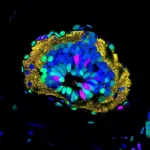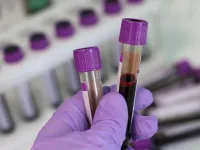(Press-News.org) Most of us have genetic variations that increase the risk of medicinal products not being effective. In order to provide a more effective treatment with fewer side effects, we need to analyse more of these genetic variations. This will provide us with more precise knowledge about how the individual patient reacts to medicinal products. A new research result from Aarhus University shows that.
Personalised medicine has been a hot topic in recent years, using information about the genes to adapt the treatment to the individual patient. Personalised medicine potentially provides better treatment and fewer side effects for the patient. At least in an ideal world.
How the body converts medicinal products - the scientific term is metabolises - is also affected - among other factors - by our genes, among other factors. Research from Aarhus University now shows that more than eighty per cent of the participants in a study based on data from the National Psychiatry Project iPSYCH, have more than three genetic variants, which increase the potential risk of the medicinal products not having the effect they should.
"Pharmacogenetic variation can impact how we metabolise or react to drugs compared with the average patients. Rapid metabolism can increase the risk of a reduced effect of medicine, and slow metabolism can increase the risk of an 'overdose' that can be experienced as side effects," explains Christiane Gasse from Aarhus University, who is leading the study.
Not only applicable to medicine for mental disorders
The researchers have analysed the frequency of genetic variants in clinically relevant drug metabolism or drug targets of 51,464 people with a diagnosed mental disorder and 26,220 without - a total of 77,684 people.
"The study has primarily analysed pharmacogenetic variants with documented recommendations of dose adjustment having great importance for the effect of the affected drugs. Many of these drugs are psychotropic medications - i.e. medicine for people with a mental disorder, but include also drugs for cardiovascular disorders. We found that more than 80% of the analysed population had more than three pharmacogenetic variants that potentially affect the metabolism of these drugs," she says.
Criteria for how the medication and dose work most effectively on the majority of the population defines the dosage of a medicine. However, the desired effect is not achived in some cases, or or patients experience side effects. Individualized treatment with medicinal products may include a pharmacogenetic test, in which the patient's genes are analysed. Based on the patient's genetic profile, it is possible to determine how effectively the actual medicine is metabolised in the individual patient.
"Most often there are several genes and genetic variants that influence the effect of the medicine. Within all medicinal products, we know of 42 variants where international pharmacogenetic consortia have described recommendations about pharmacogenetic guided dosing. They are therefore relevant for adjustments, and are therefore relevant for clinical practice," explains Christiane Gasse.
Now, genetic tests often analyse a single genetic variation, which is known to have an effect on the metabolism of the drug in question. However, the researchers believe that it would be possible to obtain far more accurate information about the patient's disposition to metabolise medicines, if more genetic variants were analysed.
The solution is a wide-ranging panel test that can analyse several pharmacogenetic variations at the same time and in this way provide the opportunity to plan more optimal treatment.
"The study demonstrates the need to use a pharmacogenetic test that analyses a wide range of genes and genetic variants. This can provide information about the choice of the right medicinal product or the right dose for the individual patient", says Christiane Gasse.
She adds that a pharmacogenetic test can either be performed prior to the first treatment with a relevant drug, and can be used as guidance for the planned and future treatments, or it can be done during the course of treatment with aim to adjust the dose and if needed the medicine.
INFORMATION:
About the study
Type of study: Pharmacogenetics (PGx) analyses the relationship between genetic variation and metabolism and effect of medicinal products. The study investigated the prevalence of variants of genes that have an influence on the metabolism and effect of medicinal products in a large Danish population-based population.
The study is financed by the Alfred Benzon Foundation, the Novo Nordisk Foundation and the Lundbeck Foundation.
Partners: Aarhus University Hospital, Copenhagen University Hospital, Department of Clinical Medicine, Department of Biomedicine and the National Centre for Register-based Research at Aarhus University.
The scientific article can be read in: Translational Psychiatry: https://doi.org/10.1038/s41398-021-01417-4
Contact:
Associate Professor Christiane Gasse
Aarhus University, Department of Clinical Medicine and
Aarhus University Hospital, Department of Affective Disorders
Email: cg@clin.au.dk
Mobile: (+45) 5119 1476
WASHINGTON, June 22, 2021 -- About 2.2 billion people globally lack reliable access to clean drinking water, according to the United Nations, and the growing impacts of climate change are likely to worsen this reality.
Solar steam generation (SSG) has emerged as a promising renewable energy technology for water harvesting, desalination, and purification that could benefit people who need it most in remote communities, disaster-relief areas, and developing nations. In Applied Physics Letters, by AIP Publishing, Virginia Tech researchers developed a synthetic tree to enhance SSG.
SSG turns solar energy into heat. Water from a storage ...
A team of scientists from the Leibniz Institute for Food Systems Biology at the Technical University of Munich has now discovered that the odorant receptor OR5K1 is specialized to recognize pyrazines in both humans and domesticated animals. These are volatile substances that contribute to the typical odor of many vegetables or are formed when food is heated. In addition, pyrazines also play a role as signaling substances in intra- or interspecific communication. The new research results contribute to a better understanding of the molecular mechanisms underlying the odor perception ...
A single measurement result is not a proof - this has been shown again and again in science. We can only really rely on a research result when it has been measured several times, preferably by different research teams, in slightly different ways. In this way, errors can usually be detected sooner or later.
However, a new study by Prof. Andrej Pustogow from the Institute of Solid State Physics at TU Wien together with other international research teams shows that this can sometimes take quite a long time. The investigation of strontium ruthenate, a material that plays an important role in unconventional superconductivity, has now disproved an experiment that gained fame in the 1990s: it was believed that a novel form of superconductivity ...
The spinal cord is an important component of our central nervous system: it connects the brain with the rest of the body and plays a crucial part in coordinating our sensations with our actions. Falls, violence, disease - various forms of trauma can cause irreversible damage to the spinal cord, leading to paralysis, sometimes even death.
Although many vertebrates, including humans, are unable to recover from a spinal cord injury, some animals stand out. For instance, the axolotl (Ambystoma mexicanum), a salamander from Mexico, has the remarkable ability to regenerate its spinal cord after an injury. When an axolotl's tail is amputated, neural stem cells residing in the spinal cord are recruited to the injury ...
Researchers have identified a combination of biological markers in patients with dengue that could predict whether they go on to develop moderate to severe disease, according to a study published today in eLife.
Biomarkers are used to identify the state or risk of a disease in patients. Examples of biomarkers can include naturally occurring molecules or genes in the vascular, inflammatory or other biological pathways. The new findings could aid the development of biomarker panels for clinical use and help improve triage and risk prediction in patients with dengue.
Dengue is the most common mosquito-borne viral disease to affect humans globally. In 2019, the World Health Organization identified dengue as one of the top 10 threats to global health, with transmission occurring ...
The ancient Maya city of Tikal was a bustling metropolis and home to tens of thousands of people.
The city comprised roads, paved plazas, towering pyramids, temples and palaces and thousands of homes for its residents, all supported by agriculture.
Now researchers at the University of Cincinnati say Tikal's reservoirs -- critical sources of city drinking water -- were lined with trees and wild vegetation that would have provided scenic natural beauty in the heart of the busy city.
UC researchers developed a novel system to analyze ancient plant DNA in the sediment of Tikal's temple and palace reservoirs to identify more than 30 species ...
HOUSTON - (June 22, 2021) - How do you kill tumor cells that can't be targeted? Get their more susceptible neighbors to help.
The Rice University lab of synthetic chemist K.C. Nicolaou, in collaboration with AbbVie Inc., has created unique antibody-drug conjugates (ADCs) that link a synthetic uncialamycin analogue to antibodies that target cancer cells.
Once they enter the targeted tumor cells, these ADCs exhibit a "significant bystander effect," according to the study. In other words, cancerous neighbor cells that aren't directly attacked by the drugs are also affected.
The study in the Proceedings of the National Academy of Sciences presents "an intriguing opportunity ...
Researchers at the University of Cincinnati College of Medicine have developed a blueprint for a protein that plays an important role in the development and regulation of reproductive organs.
The knowledge advances our understanding of the protein anti-Müllerian hormone hormone (AMH), which helps form male reproductive organs and in females regulates follicle development and ovulation in the ovaries, explains Thomas Thompson, PhD, professor in the UC Department of Molecular Genetics, Biochemistry and Microbiology.
Scientists have been looking to regulate AMH because it might play a role in developing a novel contraceptive, aid in treatments for infertility ...
An enzyme found in fat tissue in the centre of our bones helps control the production of new bone and fat cells, shows a study in mice published today in eLife.
The findings may help scientists better understand how the body maintains fat stores and bone production in response to changing conditions, such as during aging. They may also suggest new approaches to treating conditions that cause bone loss in older adults.
Fat cells, including those found in the bone marrow, are increasingly recognised as an important part of the body that helps regulate body weight, insulin sensitivity and bone mass. Fat tissue ...
DETROIT - Jessica Damoiseaux, Ph.D., an associate professor with the Institute of Gerontology at Wayne State University, recently published the results of a three-year study of cognitive changes in older adults. The team followed 69 primarily African American females, ages 50 to 85, who complained that their cognitive ability was worsening though clinical assessments showed no impairments. Three magnetic resonance imaging scans (MRIs) at 18-month intervals showed significant changes in functional connectivity in two areas of the brain.
"An older adult's perceived cognitive decline could be an important precursor to dementia," Damoiseaux said. "Brain alterations that underlie the experience of decline could reflect ...








